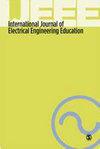The new trend of wearable technology in college foreign language classroom and its impact on college English teaching
Q2 Social Sciences
International Journal of Electrical Engineering Education
Pub Date : 2021-05-02
DOI:10.1177/00207209211003210
引用次数: 0
Abstract
With the progress of new sensor technology and Internet technology, wearable devices have gradually become the new favorite of the science and technology industry. They have been applied to various fields because of their wearability, mobility, user-centered, interactive, integrated and augmented reality characteristics. Given the shortcomings of traditional foreign language education at university, wearable technology is introduced into foreign language classroom as an auxiliary form of traditional teaching. This article chooses two courses (171 and 172 courses) to test whether wearable devices have an impact on college English teaching. The English level of these two classes is similar. With the assistance of wearable technology, level 171 is selected as the experimental course; 172 is a regular course, using only traditional teaching methods, and the experiment lasted for a semester. Practical teaching is also carried out in the class. Practical teaching results show that wearable technology assisted English teaching can not only improve students’ ability to master knowledge, but also greatly enhance students' interest in learning English.可穿戴技术在大学外语课堂中的新趋势及其对大学英语教学的影响
随着新型传感器技术和互联网技术的进步,可穿戴设备逐渐成为科技行业的新宠。由于其可穿戴性、移动性、以用户为中心、交互式、集成性和增强现实等特点,它们已被应用于各个领域。鉴于传统大学外语教育的不足,可穿戴技术被引入外语课堂,作为传统教学的辅助形式。本文选取两门课程(171门和172门)来测试可穿戴设备是否对大学英语教学产生影响。这两个班的英语水平相似。在可穿戴技术的辅助下,选择171级作为实验课程;172是一门常规课程,只使用传统的教学方法,实验持续了一个学期。课堂上还进行了实践教学。实际教学结果表明,可穿戴技术辅助英语教学不仅可以提高学生掌握知识的能力,而且可以大大提高学生学习英语的兴趣。
本文章由计算机程序翻译,如有差异,请以英文原文为准。
求助全文
约1分钟内获得全文
求助全文
来源期刊
CiteScore
2.90
自引率
0.00%
发文量
0
审稿时长
>12 weeks
期刊介绍:
The International Journal of Electrical Engineering Education''s origins date back to 1948, when the world’s first stored-programme digital computer ran at the University of Manchester. In 1963, the Bulletin of Electrical Engineering Education evolved into the International Journal of Electrical Engineering Education (IJEEE).

 求助内容:
求助内容: 应助结果提醒方式:
应助结果提醒方式:


